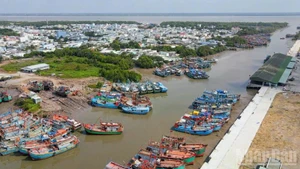The Ministry of Planning and Investment (MPI) has just announced fresh figures about Vietnam’s foreign direct investment (FDI) attraction in the first quarter of this year. Accordingly, as of March 20, 2023, total newly registered and newly added capital as well as capital from stake acquisitions and capital contributions from foreign investors reached nearly 5.45 billion USD, equivalent to 61.2% of that recorded in the same period last year.
Specifically, 522 new projects were granted investment registration certificates - up 62.1% over the same period, with total registered capital reaching more than 3 billion USD - down 5.9% year on year.
In addition, 234 projects were registered to adjust their investment capital - up 2.6% year on year, with total newly added capital of nearly 1.21 billion USD - down 70.3% from the same period last year but up 14.8% compared to that recorded in January and February.
What is more, there were 703 transactions involving foreign investors’ stake acquisitions - down 4.2% year on year, with total paid-in capital of nearly 1.22 billion USD - down 25.5% year on year.
According to the MPI, foreign investors have invested in 17 sectors out of 21 national economic sectors. In which, the processing and manufacturing industry took the lead with a total registered investment of nearly 4 billion USD, accounting for 73% of total registered investment capital and down 25% year on year.
Real estate business ranked second with a total registered investment of nearly 766 million USD, responsible for nearly 14.1% and down 71.6% year on year.
Meanwhile, the industries of wholesale and retail; and transportation and warehousing lured in more investment capital than in the same period last year, ranking third and fourth with respective total registered capital of nearly 276 million USD (up two times over the same period last year) and nearly 151 million USD (up 37 million USD).
When it comes to the number of new projects, the processing and manufacturing industry is also the leading industry in terms of number of new projects (accounting for 28.7%) and adjusted capital (65%).
However, according to the Asian Development Bank (ADB), despite difficulties, Vietnam is expected to maintain its position as an attractive FDI destination for investors.
“There are also many reasons for optimism about Vietnam’s economic prospects in 2023. In Vietnam, economic activities recovered faster than expected following the removal of COVID-19 restrictions and the achievement of nationwide vaccine coverage,” said Andrew Jeffries, ADB country director for Vietnam. “Despite a volatile stock market last year, FDI has been strong and has even picked up. There is no doubt that Vietnam’s economic prospects for the medium and long term remain very positive.”
“Foreign investors think long-term when they make their investments, and we noted that continued strong interest in Vietnam as an FDI destination. That clearly shows a long-term vote of confidence in the country. With sound economic fundamentals and strong leadership, we strongly believe that Vietnam will be able to brace the headwinds in 2023 and beyond,” Jeffries stressed.
In fact, foreign investors and partners continue to highlight Vietnam as one of the most attractive and safe destinations for their investment projects. A survey from the Japan External Trade Organisation and the European Chamber of Commerce in Vietnam noted that investors from Japan and Europe will strengthen investment into the country.
“Vietnam was becoming an indispensable part of the global supply chain for Japanese manufacturers by ranking fourth in the world in terms of favoured destinations for Japanese companies, and ranking second only behind the US in attracting funding from Japan,” said Nakajima Takeo, JETRO chief representative. More than 60% of respondents said that their company would expand their business in the next two years, a higher proportion compared to any other ASEAN country.
In addition to Japan, some big-scale commitments from giants are likely on the way. Nearly two months ago, Thailand’s Central Retail announced it would invest about 1.45 billion USD into Vietnam by 2027 to accelerate its activities. CEO Yol Phokasub said, “We are seeing Vietnam as a high-potential key market that has shown continuous economic growth.”
Italian motor vehicle manufacturer Piaggio has also raised its capital in Vietnam by 75 million USD, marking its 14th adjustment, to 165 million USD for a factory in northern Vinh Phuc Province in a plan to raise motorcycle production and assembly capacity from 250,000 to 400,000 products each year. Engine production will also increase from 300,000 to 400,000 units annually.
In another case, Chinese manufacturer and supplier of electric and electronic components GoerTek is ready for new investment to invest 1 billion USD into its factories in the provinces of Bac Ninh and Nghe An. Of this, GoerTek will use as much as 290 million USD to expand its factory in Bac Ninh first.
According to the Ministry of Planning and Investment (MPI), in 2023, Vietnam is expected to lure in as much as 36-38 billion USD in newly registered and newly added FDI as well as FDI from capital contributions and stake acquisitions, up strongly from the nearly 27.72 billion USD recorded last year. FDI will continue to serve as one of the key drivers of economic growth.
The MPI expected that FDI disbursement in 2023 will likely reach around 22-23 billion USD, almost the same as 22.4 billion USD in 2022 which was up 13.5% year on year.
According to the MPI, the key factors for FDI to continue to bounce back in this year will include economic growth results in 2022 and big efforts from the government, ministries, and localities towards improving the domestic business and investment environment, in addition to big advantages from free trade agreements which have been signed and taken effect. This will continue to consolidate the confidence of enterprises and investors.
As of March 20, 2023, Vietnam has about 37,133 foreign-invested projects registered at more than 445.3 billion USD.
In its Taking Stock released two weeks ago in Vietnam, the World Bank has suggested that Vietnam should continue boosting the reform of its business and investment climate in order to attract more FDI, especially now when the nation is in critical need of this type of capital for its socio-economic development.
The bank recommended that some barriers be removed for FDI in the service sector, which is serving as one of the key impetuses for national economic growth.
“Firstly, Vietnam could further reduce restrictions to services trade and foreign investment. The Organisation for Economic Co-operation and Development’s Services Trade Restrictiveness Index Simulators indicate that certain “backbone” services sectors – including telecommunications, logistics, aviation, legal services, banking, and insurance – still face high restrictions and that little progress has been made in removing or mitigating them in recent years,” the World Bank report stated. “For instance, foreign investment in freight transport is restricted in various ways, including in internal waterways freight and road freight (FDI up to 49% and 51% ownership, respectively).”
Going forward, the report continued, the authorities may wish to consider reducing restrictions to FDI as innovation and technology adoption relies on access to knowledge and to the networks, people, goods, and services that disseminate that knowledge globally. Moreover, the authorities also may wish to consider undertaking business environment reforms to enhance competition and access to finance for domestic firms.
New FDI commitments in Vietnam fell to a 5-year low while FDI disbursements registered a strong uptick in 2022
Foreign investors committed 27.7 billion USD in direct investment in 2022, an 11% decrease compared to 2021 and the lowest amount in five years. This decline was driven by lower committed investment in manufacturing (down 7.3%) and in power supply (down 60.4%). By type, both greenfield investments and mergers and acquisitions(M&A) continued to fall while investment in the expansion of existing production facilities continued to rise. Changes in FDI commitments in Vietnam from 2020-2022 fit international patterns: 2020 was marked by low levels of FDI commitment, which increased in 2021 as many economies started to recover from the COVID-19 crisis, but commitments were projected to fall again in 2022 given heightened risk aversion in the aftermath of the war in Ukraine. In contrast to decreasing commitments (expressions of intent) FDI disbursement in Vietnam (materialisation of intended investment) recovered from the dip in 2020-21, reaching 22.4 billion USD in 2022, a 9.9% increase from 2019. The increased implementation of FDI is due to improved confidence in the economy’s potential and resilience through the bruising COVID-19 years and the 2022 crisis.
Source: World Bank
















